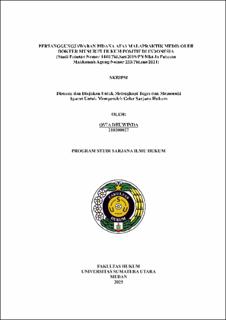| dc.description.abstract | This research is motivated by the increasing number of medical malpractice cases in Indonesia, which have serious implications for patients' rights, public trust in the medical profession, and the integrity of healthcare services. One of the main issues lies in the difficulty of distinguishing between professional negligence that constitutes a criminal offense and acceptable medical risks. Indonesian positive law, through the Criminal Code (KUHP) and various health-related statutes, has regulated several aspects of criminal liability for doctors. However, its implementation remains controversial, as reflected in the differing decisions between the District Court of Makassar and the Supreme Court in Case Number 1441/Pid.Sus/2019/PN Mks Jo Number 233K/Pid.Sus/2021. This study focuses on addressing the following problems: how criminal acts of medical malpractice are regulated under Indonesia's positive law, what forms of criminal liability may be imposed on doctors for such malpractice, and how judges' legal considerations are reflected in their decisions. The purpose of this research is to analyze the existing legal framework, evaluate the forms of criminal responsibility imposed on doctors in malpractice cases, and understand the judicial reasoning behind the court’s rulings. Theoretically, this research aims to enrich the discourse on criminal law and health law in Indonesia, while also serving as an academic reference for examining the legal aspects of medical malpractice. Practically, the findings of this study are expected to benefit students, academics, legal practitioners, and medical professionals in understanding the legal accountability associated with improper medical conduct. This research employs a normative juridical method using a statutory and case study approach. Data is collected from primary legal materials, such as the Criminal Code, the Medical Practice Act, the Health Law, and court decisions, as well as secondary sources, including legal literature, journals, and other academic publications. The analysis is conducted qualitatively to assess the legal application in actual cases of medical malpractice by doctors. | en_US |


